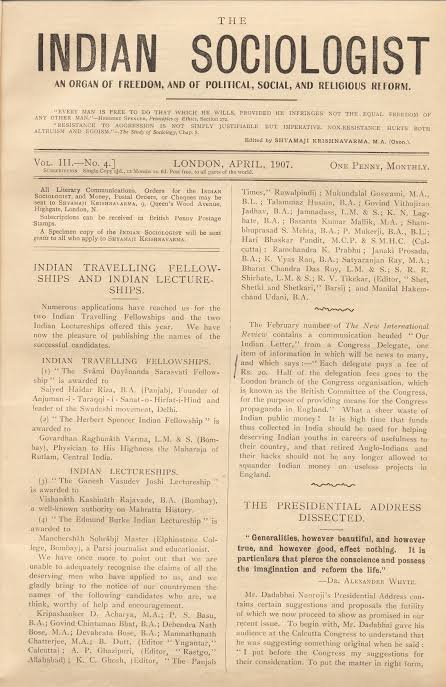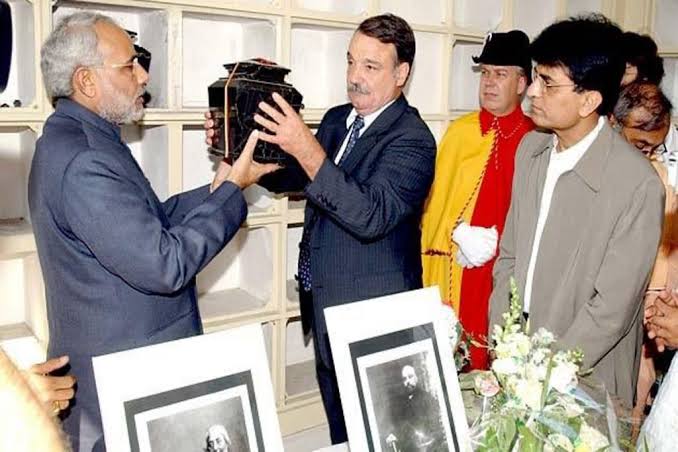
#BhupendraKumarDutta – In all his life, Bhupendra never took rest, from childhood till his death, he was fighting – for his people, for his country, the only difference is, he fought twice.
His fight continued even after independence.
His “Upavasa Satyagraha” for 78 days,
His fight continued even after independence.
His “Upavasa Satyagraha” for 78 days,

was the longest ever period of hunger strike in any country.
There’s a meaning if British forget, but when our own people erase these legends from our history?
This man’s story is truly gut wrenching, fights for freedom & sees the country divide into 3, settles in today’s
There’s a meaning if British forget, but when our own people erase these legends from our history?
This man’s story is truly gut wrenching, fights for freedom & sees the country divide into 3, settles in today’s
Bangladesh to protect Hindus, finally comes to Bharat when he looses everything.
Remembering the Forgotten Freedom Fighter on his Jayanti who our Prime Minister remembered while defending CAA in Parliament.
“I want to ask to the Congress leader, have you heard the name of
Remembering the Forgotten Freedom Fighter on his Jayanti who our Prime Minister remembered while defending CAA in Parliament.
“I want to ask to the Congress leader, have you heard the name of
Bhupendra Kumar Datta? He spent 23 years in jail. After partition, he stayed back in Pakistan,” Modi said, “When the work on Constitution was on, he said in the Constituency Assembly (of Pakistan): ‘so far as this side of Pakistan is concerned, the minorities are practically
liquidated. Those of us are here to live, represents nearly a crore of people still left in East Bengal living under a total sense of frustration’.”
Datta spoke on March 16, 1950, just a day before, Pandit Lakshmi Kanta Maitra, spoke in the Indian Parliament predicting the
Datta spoke on March 16, 1950, just a day before, Pandit Lakshmi Kanta Maitra, spoke in the Indian Parliament predicting the
failure of the Nehru-Liaquat agreement. "Sir, so far as we on this side of the House are concerned," began Datta, "we meet under the shadow of a great calamity that threatens our very existence as a community. Reports may be exaggerated, reports may be minimised.Killings may be
put in four figures but accepted in three. Women's honour may have suffered in many more cases than the world will ever come to know. There will always be different versions of the extent of the loss of property. But the fact cannot be controverted that the sudden flare-up in
East Bengal since February 10 last has left the vast numbers we represent stunned and dazed, utterly shaken and nervous and psychologically uprooted. The sudden and violent outbreak of the recent lawlessness spread over a large area both urban and rural which seemingly organised
plan behind it directed solely against the helpless minority without the least provocation has created a deep feeling of insecurity in the minority community..."
Bhupendra Kumar Dutta was born on 8 October 1892, in the village Thakurpur in Jessore, now in Bangladesh.
Bhupendra Kumar Dutta was born on 8 October 1892, in the village Thakurpur in Jessore, now in Bangladesh.
The study of the Bhagavad Gita and of works by Bankim Chandra Chattopadhyay and Vivekananda opened before him the path he wanted to follow.
An #AnushilanSamiti member from childhood, Dutta continued his activities when he joined at Scottish College, Culcatta.
And it was here,
An #AnushilanSamiti member from childhood, Dutta continued his activities when he joined at Scottish College, Culcatta.
And it was here,
Dutta decided what he wanted to do.
The meetings with Sachin Sanyal & Bhagha Jatin gave him a direction & Dutta took Bramhacharya & dedicated his life for Maa Bharati.
In 1913, he joined Daulatpur Hindu Academy, brought together his own group of college-mates interested in
The meetings with Sachin Sanyal & Bhagha Jatin gave him a direction & Dutta took Bramhacharya & dedicated his life for Maa Bharati.
In 1913, he joined Daulatpur Hindu Academy, brought together his own group of college-mates interested in
social work, raising funds for the poor by offering manual labour, gymnastics, study sessions for the Gita and essays of contemporary thinkers. They founded their own hostel, EDEN HINDU HOSTEL.
When Bhagha Jatin passed away, many revolutionaries got dejected & it was Bhupen
When Bhagha Jatin passed away, many revolutionaries got dejected & it was Bhupen
who reminded them that a revolution could not die with the leader's death.
According to Jadugopal Mukherjee, "In 1917 Bhupen occupied a special place among our leading figures."
On 17 May 1917, he was arrested on the eve of the visit to India of Samuel Montagu, and when he was
According to Jadugopal Mukherjee, "In 1917 Bhupen occupied a special place among our leading figures."
On 17 May 1917, he was arrested on the eve of the visit to India of Samuel Montagu, and when he was
in jail, he went on Upavasa Satyagraha for Fair Trial of Prisoners which lasted 78 days.
He was released in 1920, Dutta on behalf of Jugantar, met Gandhi at Nagpur Congress Session, Gandhi about NCM said “if the people responded well, he would convert the Party into free India's
He was released in 1920, Dutta on behalf of Jugantar, met Gandhi at Nagpur Congress Session, Gandhi about NCM said “if the people responded well, he would convert the Party into free India's
Republican Parliament”, Bhupen went to Pondicherry to consult Sri Aurobindo about the future of the Jugantar.
Aurobindo knew what Gandhi was & cautioned him, it happened as expected. After Gandhi's failure, the Jugantar sided Deshabandhu Chittaranjan Das & his Swarajya.
Aurobindo knew what Gandhi was & cautioned him, it happened as expected. After Gandhi's failure, the Jugantar sided Deshabandhu Chittaranjan Das & his Swarajya.
On, 9th Sept 1923, the 8th anniversary of Bhaga Jatin’s martyrdom, Chittaranjan Das, Bhupendra held a memorial all across Bharat, they sent a message that, they will follow Bhagha Jatin’s convictions & British on 23rd Sept arrested Bhupen again & deported him for Mandalay, Burma
Days later his classmate Subhash Chandra Bose became his Cell Mate too.
Released in 1928, Bhupen resumed his usual multifarious role of maintaining contacts with various Jugantar leaders from #MasterDaSuryaSen in Chittagong - #BhagatSingh in Punjab.
Bhupen was arrested again in
Released in 1928, Bhupen resumed his usual multifarious role of maintaining contacts with various Jugantar leaders from #MasterDaSuryaSen in Chittagong - #BhagatSingh in Punjab.
Bhupen was arrested again in
1930, for a period of 8 years & again in 1941 only to be released in 1946.
Bharat Gained Independence, But Country Was Into Pieces.
Feverish attempt to rescue Hindus from Muslim Fanatics Made Him Stay Back at Bangladesh, and led him to be elected as an M.P. in Pakistan.
Bharat Gained Independence, But Country Was Into Pieces.
Feverish attempt to rescue Hindus from Muslim Fanatics Made Him Stay Back at Bangladesh, and led him to be elected as an M.P. in Pakistan.
If Mullas of Bangladesh is speaking Bengali instead of Urdu, it is because of sacrifice of Dhirendranath Dutta (Tortured & Murdered by Pak in 1971) Bhupendra Kumar Datta, Prem Hari Barma and Sirish Chandra Chattopadhyay.
Pakistan imposed Martial Law, in 1958 & Bhupen waited
Pakistan imposed Martial Law, in 1958 & Bhupen waited
for 4 years to renew his activity, but said goodbye to Pak & politics in 1962 and returned to Bharat.
What he did in next 17 years, we may never know as Communists never appreciated freedom fighters & it was their government.
Just Imagine, a google search will give us
What he did in next 17 years, we may never know as Communists never appreciated freedom fighters & it was their government.
Just Imagine, a google search will give us
ONLY ONE PHOTO of Bhupendra. Shame On Us.
And The Freedom Fighter left the world quietly on 29th December 1979 at Calcutta.
#BhupendraKumarDutta_Jayanti
#ForgottenHeroes
#VANDEMATARAM
And The Freedom Fighter left the world quietly on 29th December 1979 at Calcutta.
#BhupendraKumarDutta_Jayanti
#ForgottenHeroes
#VANDEMATARAM
• • •
Missing some Tweet in this thread? You can try to
force a refresh













